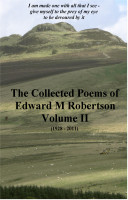
The Collected Poems of Edward M Robertson – Volume II
By Ian Robertson
The first point I need to make is that I was not able to find this volume on Barnes and Noble or Goodreads, which are where I also like to place my reviews, so I will have to settle for Smashwords and my blog!
Price for The Collected Poems of Edward M Robertson- Free!!!
Blurb- This second volume of The Collected Poems of Edward M Robertson has been produced so that additional material, discovered while sorting through his papers, can be made available.
Those who knew Edward will, no doubt, be able to identify with many of the images and emotions he expresses and will hopefully take pleasure in exploring these additional poems.
For those who did not know Edward personally, we hope that reading this small volume of poetry proves to be a rewarding experience.
Genre- Poetry, Collections
My Rating- 5 meows!!! It’s the cat’s pajamas!
My Review- This is a collection of poems. You obviously don’t have to read the first collection. It’s tough, however, to review a compilation of poems. I will say this. They were all very nice, but two poems stuck out, so I’ll provide them both as an excerpt, and give a review of those two poems.
MARCH IN THE BORDERS
The red fields lie
open to the dry March wind –
rolled flat and burdened with seed –
corn, wheat, barley and rye.
They wait for life, rain-awakened.
And always they sweep the eye on, up
to a sea of hills,
wind-tossed and bare –
or suck sight down to
the valleys
deep-clefted and filled with trees –
a hundred years old or more –
where vision follows the circling bird
down and down into
the blue depths
of a Chinese pattern of peace.
I sit on top of Ruberslaw
and feel myself like a windhover
hang in the air,
but where he sees and clutches with
his eye only the quivering blade
and threads the vole’s individual,
all- excluding heart beat
to him,
to him,
I see all at a rolling endless sweep of the eye.
And while the kite-kestrel
tugs at the taught thread of sight
that draws him down suddenly,
I am made one with all that I see –
give myself to the prey of my eye
to be devoured by it.
It seems to me a man is looking out at a newly planted field of crops. He knows the barren field will sprout to life with rain.
Among the new life, those seeds that are or will sprout, there are old trees, wise trees that have seen it all.
While children see only what is obvious, what is right before them, an old man knows how to see everything around, all at once, but there is beauty in both views. One is sweet, innocent, the other is wise and learned, yet the old man gives in to his coming death.
It’s so sad.
ROOKS
Here is the last true countryman who
walks hands-in-pockets
across the wide fields;
carries a pick-axe on his face,
head hammering it hard
into the firm ground, then,
with his battered brains,
staggers awkwardly about the furrows.
Yet, in a moment, he
becomes the graceful ballet dancer
of the skies, as spread-winged
he flies upwards
mounting the invisible staircase
of air, to a height, where,
with a twist of the wrist of flight
suddenly he falls off the edge
of the wind, tumbling
down, wing-over-wing,
sweeps over grasses and swoops
up to a tangle in the tall trees’ hair,
his nest, a scribble in the topmost
branches. And there he sits
and smoothes the rumpled wind
with velvet cawing.
Yet he is never ‘rook’
but always ‘rooks’ –
leaves sprouting from one living
invisible rook-tree,
a sky-shoal netted with rook calls.
But on the ground again, in meek
ploughman fashion, he follows
the sharp share of his
air-furrowing beak.
It seems to me that a bird is working very hard to find food in the ground. It may move awkwardly on land, but is graceful in the air.
A bird, although a work of art in the sky, can’t remain there, and it retreats to its home, in the tree. Even in the tree, in fact wherever it is, the bird is more than just a bird. It’s a part of everything around it, and everything is a part of the bird.
Nevertheless, even the greatest, strongest, or most beautiful of living creatures has to work for food.
I think it’s semi allegorically likened to the lives of men, but not individual people. I mean men as a collective. We are all beautiful. We are all a work of art. We are all a part of each other, and since we all have to work to eat–work to live, that is–we are all equal.
Alright, so, all-in-all March in the Borders and Rooks were definitely my favorite poems in the collection. There were actually two more I was going to include, but then the review would have dragged on, and then I would have wanted to include more poems, and so on. Truthfully, I’ll say this, there were only three, or maybe four, poems that I didn’t like, but when it comes to poetry, I never “dislike” a poem, so the ones I didn’t like, I didn’t not like them, they just didn’t speak to me.
If you enjoy poetry, I think you’ll enjoy The Collected Poems of Edward M Robertson – Volume II. I’m sure you can even get away without reading The Collected Poems of Edward M Robertson – Volume I, but I may go back and read those as well.
First I have some Goodreads recommendations to handle, though! See you next time, hunny bunnies!
Download The Collected Poems of Edward M Robertson – Volume II from Smashwords